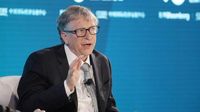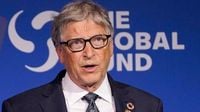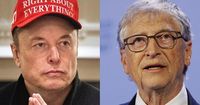In a groundbreaking announcement, Bill Gates revealed on May 8, 2025, that he will donate 99% of his remaining tech fortune to the Gates Foundation, which is set to close its doors in 2045, earlier than previously planned. This monumental pledge, currently valued at an estimated $107 billion, ranks among the largest philanthropic gifts in history, outstripping the contributions of renowned industrialists such as John D. Rockefeller and Andrew Carnegie when adjusted for inflation. Only Warren Buffett’s promise to donate his fortune, estimated by Forbes at $160 billion, may be larger, depending on market conditions.
Gates' donation will be allocated over time, allowing the foundation to spend an additional $200 billion over the next two decades. The foundation, which Gates co-founded with his ex-wife Melinda French Gates in 2000, already boasts an endowment of $77 billion, a significant portion of which has come from Buffett, who has contributed about 41% of the foundation’s total funding.
“It’s kind of thrilling to have that much to be able to put into these causes,” Gates said in an interview with The Associated Press, emphasizing his commitment to global health and education in the U.S. His announcement signals a promise of sustained support for these causes while also marking the eventual end of the foundation’s significant global influence.
Since its inception, the Gates Foundation has spent $100 billion on various initiatives worldwide, focusing heavily on eradicating diseases and improving educational opportunities. The foundation has played a crucial role in shaping global health policy, partnering with countries and organizations to make medical treatments more accessible to low- and middle-income nations. Gates noted, “The foundation work has been way more impactful than I expected,” calling it his second and final career.
However, the announcement was not without controversy. Gates took the opportunity to criticize fellow billionaire Elon Musk for his role in slashing funding to the U.S. Agency for International Development (USAID), which he accused Musk of effectively dismantling through his Department of Government Efficiency (DOGE). Gates stated, “The picture of the world’s richest man killing the world’s poorest children is not a pretty one,” highlighting the potential consequences of these cuts, including a resurgence of diseases like measles, HIV, and polio.
Gates expressed concern that Musk’s actions could lead to millions of additional deaths globally. “The number of deaths will start going up for the first time… it’s going to be millions more deaths because of the resources,” he warned in an interview with Reuters. The cuts to USAID, which spent $44 billion worldwide in fiscal 2023, have been significant, with around 80% of its programs set to be eliminated.
In a separate interview, Gates lamented the broader implications of the U.S. pulling back from global health and humanitarian assistance, stating, “It’s unclear whether the world’s richest countries will continue to stand up for its poorest people.” He emphasized the urgency of addressing these challenges, asserting that “there are just too many opportunities to lift people up for us not to take them.”
The Gates Foundation, which has focused on reducing childhood mortality rates, has reportedly halved such deaths between 2000 and 2020, according to the United Nations. Gates reiterated his commitment to using his wealth to address pressing global issues, saying, “People will say a lot of things about me when I die, but I am determined that ‘he died rich’ will not be one of them.”
In light of the foundation's closure in 2045, Gates aims to ensure that his contributions make a lasting impact on global health and education before the foundation ceases operations. “I think 20 years is the right balance between giving as much as we can to make progress on these things and giving people a lot of notice that now this money will be gone,” he remarked.
The announcement has been met with mixed reactions from the philanthropic community. Rhodri Davies, a philanthropy expert, described Gates’ pledge as “a welcome bit of boldness,” suggesting that it reflects a shift in norms surrounding foundation philanthropy, moving away from the traditional model of operating in perpetuity.
As Gates prepares to allocate his wealth, he remains focused on the foundation’s mission: “Where you are born should not determine your opportunities.” He hopes that by accelerating his giving, he can help put the world on a path to ending preventable deaths and alleviating poverty.
In summary, Gates' commitment to donating the majority of his fortune marks a significant moment in the landscape of philanthropy. It underscores not only his dedication to addressing critical global issues but also highlights the potential risks associated with the withdrawal of funding for essential programs like those provided by USAID. As the world watches how this massive donation unfolds over the next two decades, the implications for global health and education remain paramount.






